By Jason Apuzzo. Let me begin by saying that this review is written for people who have not already been irretrievably burned by Oliver Stone. To those of you out there who have been irretrievably burned by Stone, you have my sympathies and my understanding – and if you feel sufficiently put off by Stone’s behavior over the years never to watch another one of his films, I will not argue the point. Stone is to blame for that, not you. So if you wish to proceed to another post here at Libertas, you have my blessings.
You would, however, be missing out on what is actually quite an enjoyable film in Wall Street 2 – a film that, much like the original Wall Street, is weirdly at odds with its creator in creating such a compelling and seductive portrait of a system the filmmaker supposedly despises. In this, Wall Street 2 becomes the latest example of a film that actually appears savvier and more insightful – not to mention warmer and more sentimental – than the man who made it.
I must confess that I was not expecting Stone’s film to be enjoyable, for at least three reasons. One, Stone’s skills as a filmmaker have atrophied significantly over the years. What originally put Oliver Stone on the map, culturally speaking, were well-constructed (if obnoxious) entertainments like Platoon and JFK. Stone’s Alexander, however, was easily one of the worst films I’ve seen over the past decade – a mess on so many levels that I can’t even imagine how the film ever got made, let alone released. And Stone’s World Trade Center seemed to miss its moment; if you think no one remembers 9/11 any more, absolutely nobody remembers Oliver Stone’s film about it. World Trade Center was an anodyne, strangely uninteresting exercise for such a voluble director as Stone – a lugubrious, by-the-numbers drama that could easily have been a made-for-TV movie, and that disgracefully avoided the subject of terrorism altogether. That Stone would avoid the subject of terrorism was not only dishonest and ideologically loaded on his part, but at odds with the drama of the moment – like making a movie about Pearl Harbor without mentioning Imperial Japan.
The third reason, of course, has to do with Stone’s compulsive politicizing of everything he does – and the Wall Street meltdown of 2008 seemed altogether too ripe an opportunity for someone with his blunderbuss sensibility – a kind of smorgasbord of possibilities to take potshots at the capitalistic system that has, of course, made his own career possible.
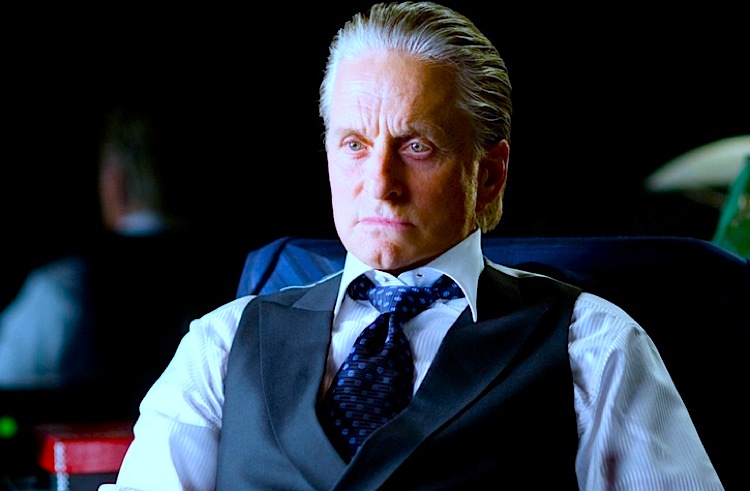
What I will confess to have forgotten, however, was what a seductive portrait of Wall Street Stone’s original Wall Street film was. Stories of the guys who were lured into lives as stock traders by Stone’s film – and by the magnetism of Michael Douglas’ Gordon Gekko character – are legendary, and form part of the strange and contradictory afterlife of that film as a high-end cult phenomenon. Wall Street did for The Street in the 80s what Top Gun did for the military. What Stone’s original film captured was the drama, the adrenaline rush, the heat and speed of the Wall Street lifestyle as it’s lived on a daily basis. Personal note here: I was close to two guys at Yale who were obsessed with Gekko (and American Psycho), and who got swept right into that world in the early 90s – and I mean all of that world, with its giddy, steroidal highs and humiliating lows. A world of glitzy New York penthouses, weekends in the Caribbean, coke, endless women, media scandal … and ego. Greed? Yes, there was that as well – but I never really bought the idea that what drives the guys on The Street is greed, per se. It always seemed more like ego, the desire to win – or at least, survive. More on that subject below.
And so the perverse truth of the matter is that Stone himself is as much to blame for today’s Wall Street as anybody else – which may be why he pops up occasionally in Wall Street 2, playing a cameo role an investor. [Which, incidentally, his own father was – his father having been a stock broker and a Republican who was broken by The Street and eventually went bankrupt.]
Wall Street 2: Money Never Sleeps brings this adrenaline-fueled world of Gordon Gekko back – with all its stratospheric highs and punishing lows – and updates it to the world of today, the world of the financial markets post-crash. And it attempts to incorporate what Stone has learned (if not necessarily what the rest of us have learned) from that calamity. Not surprisingly, what Stone has learned from the Meltdown is that greed was its driving force – not just the greed of the Wall Street guys (and they are depicted almost uniformly as guys in this film – there’s hardly a female in sight), but all of our greed. Greed here is defined as our current tendency to overreach, to live off little more than borrowed money and a prayer. For example: greed in the way we re-finance homes, based on … what? A desire to free up some cash without really doing anything. Or the way we leverage our other assets based on … what? Too often just a hope.

There’s truth in Stone’s critique, of course – not nearly the whole truth about what brought down the market, but certainly enough truth to serve as a kind of moralistic backdrop to Stone’s real business, which is actually not political at all. Wall Street 2 is really about about something else altogether, which is: how to maintain one’s integrity not only in the high-pressure environment of finance, but in the ultimate high-pressure environment of one’s own family. In essence, how do you preserve your own ego – when even people you love may be putting your well being in jeopardy?
Wall Street 2 is essentially a kind of 2-hour, five-Act Shakespearean family drama that begins with Gordon Gekko leaving jail in 2001, being given back his few remaining momentos from the 80s. [This is the great scene from the trailer, when he poignantly gets his empty gold money clip back – and his gigantic, 80s-era mobile phone.] Gekko leaves the jail, walks outside into the sunlight to find … no one waiting for him. He’s become the quintessential forgotten man. Flash forward to 2008, and the central character of the film: Shia LaBeouf’s ‘Jake Moore’ character. LaBeouf is a young guy on The Street, making his way up, who has two things that define him: he’s got smarts and is street-savvy (more so than Charlie Sheen from the original film), yet he also has an ‘idealistic’ side to him that’s kept fully charged by his web-activist girlfriend (Carey Mulligan), who just happens to be Gordon Gekko’s estranged daughter, Winnie. Winnie is extremely wary of her father, blaming him for the (off-screen) drug-related death of her brother. Gekko himself by this point in 2008 has now become a ‘reformed’ man, a best-selling book author whose media jeremiads are designed to warn others off of his earlier ‘bad’ example.
WARNING: SPOILERS AHEAD
Jake and the rest of Wall Street then undergo the 2008 meltdown, in which Jake’s financial house goes down – and Jake’s soft, humanistic mentor (Frank Langella) commits suicide. There’s something extremely dramatic about these early sequences of the film, because we get the sense of real history playing out – and Stone’s handling of these moments when the Feds are trying to decide who to bail out (or not) are handled nicely. One gets the sense of the arbitrariness, the messiness and – crucially – the egos involved in deciding who was to be saved, and who would walk the plank. We all like to feel that these were clean, impartial decisions – yet we know by now that they weren’t. [Why was Lehman allowed to go down, for example, but not AIG?] These decisions were as much a result of the personalities involved as the economics, or the politics for that matter.
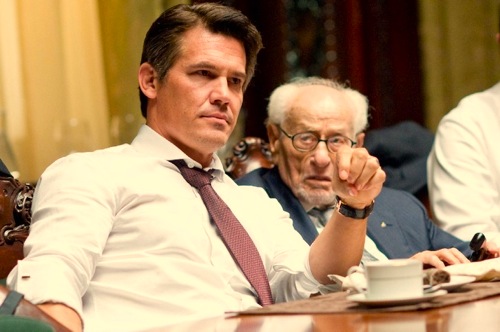
Although Wall Street 2 is chock-full of politics – it’s an Oliver Stone film, so how could it not be? – Stone is to be commended for indulging in no Bush-bashing here, or elsewhere in this film. These tense early sequences play as I suspect they played out in real life – which is to say, on a knife-edge of suspense, as everybody – Republicans and Democrats – stared right into the abyss. Stone avoids political finger-pointing here, recognizing the gravity of the moment. In fact, the ‘reformed’ Gordon Gekko actually speaks up early in the film for the Bush Administration – admonishing people for rushing to blame Bush’s Administration for problems that were largely beyond their control. So if you’re expecting Wall Street 2 to roast Bush and Cheney over the coals – which Stone’s increasingly bizarre and erratic interviews seem to suggest – there’s none of it in the film. The bailout is presented as having essentially been the lesser of two evils: the ‘socialization’ of the market, in order to protect from 1929 Crash Redux (only worse).
We then proceed to what is the central, two-fold drama of the film. LaBeouf’s Jake Moore character blames the death of his mentor on Wall Street’s new Master of the Universe – a WASP honcho named Bretton James, played with silky menace by Josh Brolin. James is a kind of dark, Renaissance prince – a high-level manipulator of men and money, the new Gekko – who may previously have been involved in Gekko getting an extra 8 years tacked onto his sentence, so Gekko has his own reasons for hating him (i.e., his ego is involved). Jake and Gekko essentially team-up to take down/take over James, while Jake helps Gekko get back into his estranged daughter’s life. The two, in effect, become ‘trading partners’ – with Jake trading access to Gekko’s daughter for information that can help him take down Bretton James, who also happens to be his new employer. If this seems complicated, it isn’t really – it’s just part of a rich and satisfying drama that unfolds with many poignant twists and turns.
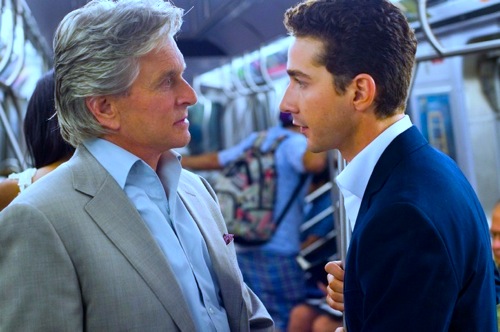
The meat of the film consists in Gekko’s awkward and painful efforts to reconcile with his daughter, and Jake’s efforts to ‘do the right thing’ under increasingly complicated circumstances. None of this, frankly, has much to do with politics – it all rests on the actors, and the emotions built up between family members trying to retain their integrity, even when that means shunning people they love. Everybody is trying to hang on to their egos here – for better and for worse. There are a lot of poignant, interesting moments in Wall Street 2 when family members are, in effect, trying to ‘get something’ out of someone they love – whether it’s money, or information, or some semblance of affection. But there’s always a price. Everybody’s a ‘trader,’ Stone seems to be saying – whether they work on The Street or not. But there are honorable and dishonorable trades, a kind of Bushido code that isn’t to be broken – especially inside families – and one character in the film breaks that code, in a moment that’s quite shattering. I won’t reveal which. But that code gets broken because a certain character wants to get back in the game, to have his ego validated – not because of the money he’ll make, or because of ‘greed,’ but because he’ll prove himself to have been a survivor, the ultimate Top Dog.
I have to commend both Michael Douglas and – yes – Shia LaBeouf here. Their performances are outstanding. Especially affecting were the scenes in which Douglas attempts to reconcile with his daughter, to somehow account for the pain he’d caused in her life – while not surrendering his own integrity, or invalidating his own life. These moments felt very real. I suspect that these moments were, in fact, probably why Stone made this film. I get the sense Stone has left a lot of wreckage behind in his life, and that his own parents may have left some behind with him. It all comes gushing out in this film – much more so than the politics, frankly. As for Shia LaBeouf, can we admit that he can carry a film now? Wall Street 2 is essentially on his shoulders, and I think he does a marvelous job with it. He comes across as an emotional guy, a tough hot-head with a code of honor, whose every effort is to retain his integrity – but what happens when your ‘integrity’ pulls you in conflicting directions? What happens when ‘integrity’ puts you at odds with people you love?
This leads, again, to what I think is really the subject of Wall Street 2, a subject that Stone was perhaps not mature enough to address in the original film: strong egos in conflict, even within families. Wall Street 2 doesn’t really have much to say that’s original about Wall Street that couldn’t also be said, for example, about Washington or Hollywood – i.e., any fast-paced, hyper-competitive environment in which a great deal is at stake. What’s valuable about the film is what it says about the personal, ego-based aspect of these environments, and also about how people struggle to retain their egos even in the ostensibly ‘safe’ environment of the family. What Stone seems to be saying in this film is that not only is it a struggle to retain one’s integrity in these glamorous, seductive environments – but that it can also be a struggle to retain one’s integrity in one’s own family, where individual interests and egos are supposed to be sublimated into a greater whole. That’s a very mature message, frankly – a lot more than I was expecting from this film, or from this director.
What ultimately makes Wall Street 2 work is that it features strong, vivid characters – whose strength consists in the tenacity they exhibit in hanging on to who they are, at all costs. That even includes the villains, by the way.
A few details on the film’s politics, which I owe Libertas readers: the film may be considered an apologia for the bailout, although it strongly suggests how arbitrary the bailout was. The film ignores utterly the following names: Fannie, Freddie, Barney Frank, or Christopher Dodd – thereby making the story of the Meltdown highly incomplete, of course. Barack Obama makes a few fleeting appearances, but tellingly only on bumper stickers and newspapers – not as an enabler of Fannie and Freddie’s excesses, which he clearly was; he merely exists in the film as a kind of far-off presence, a hope of the future – and this treatment is not only grating, but also behind the times. Perhaps that vision of Obama prevailed while this film was in production, but it certainly seems preposterous now. Also: Stone seems unaware how much Obama himself is a kind of illusion, a ‘bubble’ that’s burst much like the market. Both the housing crisis and the Obama campaign were leveraged on fantasies, and the debts for those are now coming due.
Another fanciful subplot of the film involves a sci-fi style hydro/nuclear energy technology that Shia LaBeouf keeps trying to get everybody to invest in because it would supposedly save the environment. Whatever. It apparently doesn’t occur to Stone that the Ducati motorcycles he’s so in love with (so am I, by the way) won’t run very well on recycled fuel cells, nor will very much else at the moment.
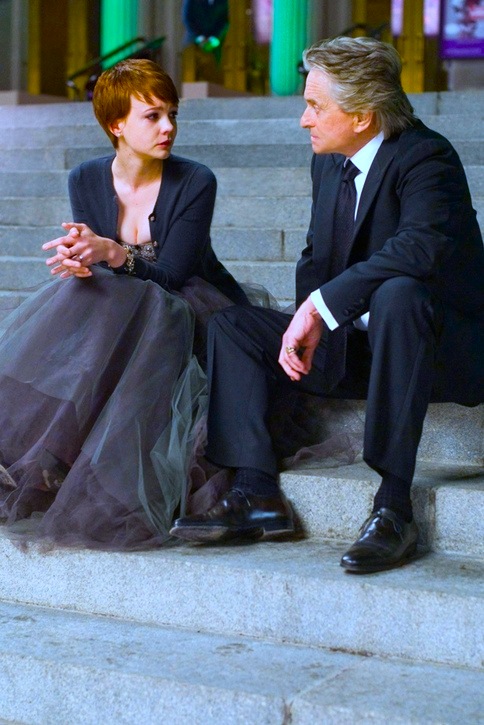
Oh, and Gekko’s daughter Winnie is essentally a cutesy-pie left wing web activist, who runs a not-for-profit website. Why she doesn’t make a profit is beyond me, by the way – she should just go work for Arianna or Kos, because they’re the ones raking it in right now.
Some final words on the cast, and a few other noteworthy aspects of the film: Josh Brolin is superb as the film’s heavy, and Susan Sarandon (yes, I know) has fun in a minor role as Shia LaBeouf’s real estate agent mother – although her fake New York accent his horrific. I have huge problems with David Byrne’s music for the film – I thought it was terrible, langorous and spacey when it should’ve been sexy and cathartic. Byrne is such a bore – why did that guy ever have a career? He stinks up the place. This film needed something like U2 or the Stones so badly it hurt. Hell, even Lenny Kravitz would’ve been better – that’s how bad David Byrne is.
There is also a completely hilarious cameo by Charlie Sheen in the middle of the film; Stone gives us a little glimpse at Sheen’s character 20+ years later, after the events of the original Wall Street. I won’t say anything more except to say that it’s a total hoot. Oh, and it was also great to see Eli Wallach in a brief but important role.
Otherwise, the clothing on the men looked great – especially the suits on Douglas, LaBeouf and Brolin – and I loved their motorcycle jackets, as well. Those were killer. As for the women? There are almost none in this film – outside of Carey Mulligan, some eye candy in the New York clubs, and five minutes’ worth of Sarandon. And this, incidentally, is a major problem not only with Stone’s film – but with films made by Baby Boomer men of Stone’s generation. It never seems to occur to these guys that the Gordon Gekkos of this world – who are, ultimately, darker versions of themselves – might not become the villains they are if they had some decent women in their lives. I’m quite serious about this. Carey Mulligan has a big job in this film as practically the only woman around – and she’s just not up to it, in having to ‘redeem’ every male with an identity crisis in a 60 mile radius. How could she? She’s practically the Virgin Mary in this film, with every male in sight begging for her approval.
An interesting idea suggested by Govindini, in order to bring some women into the picture, might’ve been to have Catherine Zeta-Jones play Josh Brolin’s role – just to relieve the unremitting landscape of dudes in gray suits.
In any case, here’s what it comes down to: Oliver Stone, much like Gordon Gekko, has left a train of bad feelings over the years. A lot of us are angry at him for a lot of reasons. On the other hand, Stone’s made some passable films, and built some good careers for people. He also, need I remind everybody, volunteered for combat in Vietnam as a young man and served quite honorably. Plus, I suspect, there is a softer, more human side to him than he may be comfortable letting on. Only you in the audience can decide whether, like Gekko’s daughter, you have any interest in letting the old crab back in. I can’t decide that for you, but I did enjoy his film. And I’m already wondering, frankly, if The Social Network will move me the way Wall Street 2 did.
Posted on September 24th, 2010 at 10:20pm.
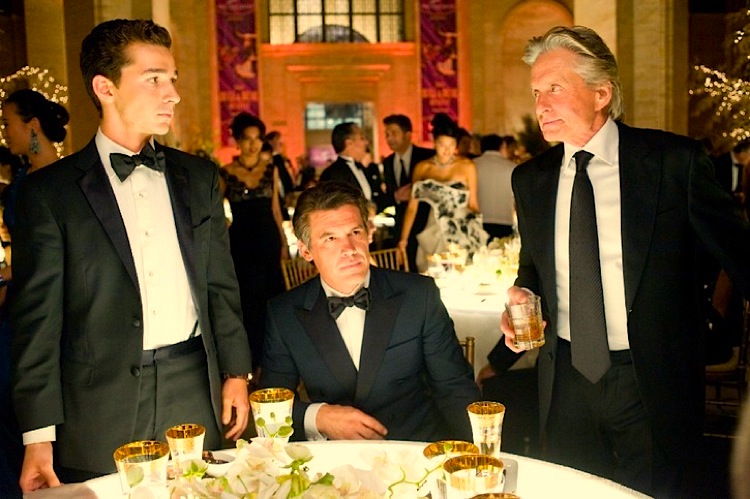

You’ve sold me, Jason. And in regard to Oliver Stone let me quote a great liberal icon and a good man, Adlai Stevenson; “For my part I believe in the forgiveness of sin and the redemption of ignorance. “
Very good! Perfect quote.
Oliver Stone is the modern day Walter Duranty.
I won’t argue the point. He dug that hole for himself, so he’ll have to climb his way out. I’m just commenting on the film.
Not sure he wants to climb out. Not sure he could climb out if he wanted to. The BBC did a pretty good show about Lenin’s useful idiots several weeks ago. Some of them, years later, realized they had been manipulated and looked back on that time as though they had come out of a fog. Others were so committed to their ideology, they didn’t care. They liked the fog. Stone seems to like the fog.
http://www.bbc.co.uk/worldservice/documentaries/2010/07/100624_doc_useful_idiots_lenin.shtml
He does seem to like the fog. I suppose it’s a kind of drug for some people.
“but that it can also be a struggle to retain one’s integrity in one’s own family, where individual interests and egos are supposed to be sublimated into a greater whole. ”
Hmmm, it’s almost like he is moving away from collectivisim in his maturity.
It’s hard to say, because I think his emotions may be pulling him in a direction different from his head – where I suspect he remains a committed socialist.
Only Nixon can go to China. Maybe only Stone can do an unbiased movie about Wall Street.
That’s an interesting analogy. My sense is that he does understand the psychology of The Street well, which I assume is a result of his father’s experiences. On balance, the film felt very real – while still being colorful and entertaining.
As much as I despise Oliver Stone, I love the first “Wall Street”. It’s an intellectually honest picture in its willingness not to make Wall Street the personification of the free market — Gekko often says he hasn’t created anything, but rather he’s speculated, bought, sold. Martin Sheen’s character is not only a great foil to Gekko, but also part of an arc that really grounds the picture.
It’s good to see that Stone advances this theme in his new picture.
Still, it’s strange that Stone, a Castro-loving collectivist, and me, a Reagan conservative, can share a tiny thread of common ground in our distrust of Wall Street. He doesn’t care for it because it’s a vehicle for capitalists to change their financial status; and I don’t care for it because it’s always been all too willing to side with progressives in their command-and-control endeavors.
Great review as always, Jason. I’m excited to see this film.
Thanks, Vince, I appreciate the kind word! As for the Wall Street guys, yes they’ve never particularly had my trust either. I try to base my own worldview on things more substantial than a worship of capital, which some contemporary strains of conservatism seem to slip into.
Just saw the film this afternoon, and read your review shortly after. One of the things that struck me yesterday when I watched the first Wall Street again was the prominence of the Twin Towers in the opening skyline views of New York, and their absence in the new film’s skyline shots was palpable. I’ve never been a fan of Shia LaBoeuf and I’m still not sure he can carry a film on his own, this performance notwithstanding. However, he did acquit himself well here and I won’t label him as the dramatic version of Michael Cera just yet.
One point where I part ways with your review is regarding your remarks about David Byrne’s music. The music of Byrne and Talking Heads is in its own way as emblematic of New York as that of The Ramones or Lou Reed. In addition, the pop glossiness of Byrne’s melodies combined with his staccato rhythms is a fitting aural equivalent of the tensions and the seductive artifice of the financial system as portrayed in the film.
Other than that quibble, I think your review of the movie is spot on and certainly the best one that I have read.
Thanks, Phil, I appreciate it.
Thanks for the review, I look forward to watching this film. Interesting highlight that Carey is the only woman, that must have been a lot of pressure for her, wonder if she acted up to her role? I will have a better idea after I watch it this weekend.
Hey! Love your site. Thanks for stopping by.